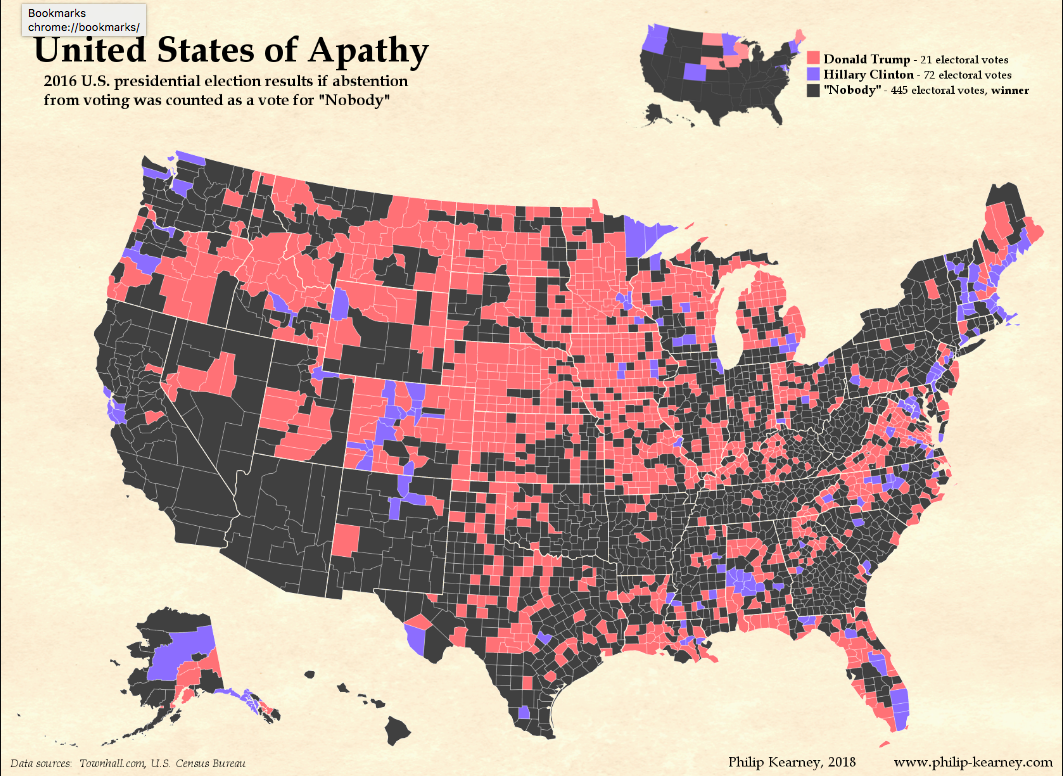
|
A map of the 2016 elections. All the counties depicted in black are places where, if all the eligible voters (note that is not the same as “registered” voters) who didn’t vote had voted as a bloc their vote count would have exceeded that gathered by Trump or Clinton, i.e. those non-voters could have elected “Nobody.” Source: Philip Kearney, an amateur cartographer based in Austin Texas. Click here for the full page version. |
Dear Group,
Yesterday I wrote about the four “debates” scheduled between Lisa Brown and McMorris Rodgers. (“Debates” is in quotes because as yet we don’t know what the format will be. Who makes up the questions? Who asks them? What are the rules? Are these really “debates?”) Understand this: a whole lot of the people who pay attention to these “debates” are voters who have already made up their minds. They are already engaged and unlikely to change direction except in the event of a major faux pas. Yes, what happens there is important in an election that may turn on a small margin (Remember George Nethercutt unseated Tom Foley by roughly 4000 votes out of 220,000 in 1994), but the debates are just a part of a large picture.
Take a look at the map above. Click the links in the caption for more detail. In 2016 eligible voters who did not vote, had they voted as a bloc, would have beaten both Clinton and Trump. We’ll call their candidate (since they didn’t vote) “Nobody.”
Take a close look at eastern WA. Did you assume that central square of red was Spokane County? I did. Look again. It’s Lincoln County, not Spokane. Lincoln County has a grand total of around 7000 registered voters (and another 3,300 eligible but not registered). The other three are Pend Oreille, Garfield, and Columbia. All together those four counties currently total 20,440 registered voters (and another 9000 eligible but not registered). The registered voters in those four counties represent only 4.6% of the total registered electorate in CD5 (about 435,000). Broadly, in U.S. Congressional District 5 in 2016 “Nobody” likely could have beaten either Clinton or Trump. Granted that’s a big hypothetical, but still…the point is that a whole lot of eligible voters aren’t paying attention, much less watching “debates.”
Every vote counts. Voters who will make the difference come election day on November 6 are all those Democrats who usually vote just in the Presidential election years, not in the midterms, along with those Democrats who have come to feel their vote in CD5 just hasn’t counted recently…the dispirited Democrats. Those folks now have reason to hope.
There are good Democratic candidates in nearly every race this fall. That is a change from recent years when, oftentimes no Democrat even filed. Each of them contributes to the electoral buzz.
My conclusion from all this? The debates will be interesting and worth watching, worth talking about for the excitement they produce, but the real difference will be made door-to-door, face-to-face, person-to-person. convincing the dispirited and disconnected this is the time their vote can really make a difference. Adopt a candidate, get to know them, join their campaign. Make it happen.
Keep to the high ground,
Jerry